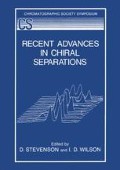Summary
Chiral separations are presented which demonstrate the role of mobile phase additives for enantiomer separations by high-performance liquid chromatography (HPLC).
Salts of relatively hydrophobic (log P > 2.2) aminoalcohol racemates are often resolved as free bases on chiral stationary phases (CSPs) using organic eluents modified with a base. However, efficient chromatographic separations for a number of more hydrophilic molecules of this type have been precluded by their low solubilities in organic solvents. Using a CSP we have developed acidic eluents which generate organically soluble ion pairs. The optimum acid has been identified. For a range of compounds the selectivity of acidic and basic eluents was compared and related to log P. Acidic eluents offered significant advantages for polar aminoalcohols.
In a second example a substituted 1,3-dioxan was resolved using a Cyclobond I (β) CSP. The efficiency, selectivity and capacity of this separation were measured and a comparison with results obtained using a nitrile (CN) column with ‘β’-cyclodextrin as an eluent additive was made. Data are presented to illustrate eluent/column selection. Enhanced parameters were obtained using the modified eluent.
Finally the application of several CSPs for the optical purity measurement of a methotrexate analogue is discussed. In this case it was also perceived that the solute anion would bind to serum proteins. A separation was achieved using bovine serum albumin (BSA) in a buffered eluent on a Diol column. The effects of pH, bonded phase and organic modifier are presented.
The use of eluent additives has proved to be a flexible technique for the separation and isolation of polar water-soluble enantiomers which are poorly resolved on CSPs.
Access this chapter
Tax calculation will be finalised at checkout
Purchases are for personal use only
Preview
Unable to display preview. Download preview PDF.
References
C. Pettersson, Trends AnaL Chem, 7: 209–217 (1988).
R. Gaskell and B. Crooks, in “Chiral Separations”, D. Stevenson and I. D. Wilson, eds, Plenum, New York, 65–70 (1988).
Y. Okamoto, M. Kawashima, R Aburatani, K. Hatada, T. Nishiyama and M. Masuda, Chem. Letters, 1237–1240 (1986).
U. Kragh-Hensen, Pharm. Rev, 33: 17–53 (1981).
Author information
Authors and Affiliations
Editor information
Editors and Affiliations
Rights and permissions
Copyright information
© 1991 Plenum Press, New York
About this chapter
Cite this chapter
Gaskell, R.M., Crooks, B. (1991). The Role of Mobile Phase Additives in Developing and Optimising Separations of Water-Soluble Enantiomers by High-Performance Liquid Chromatography. In: Stevenson, D., Wilson, I.D. (eds) Recent Advances in Chiral Separations. Chromatographic Society Symposium Series. Springer, New York, NY. https://doi.org/10.1007/978-1-4684-8282-9_12
Download citation
DOI: https://doi.org/10.1007/978-1-4684-8282-9_12
Publisher Name: Springer, New York, NY
Print ISBN: 978-1-4684-8284-3
Online ISBN: 978-1-4684-8282-9
eBook Packages: Springer Book Archive

